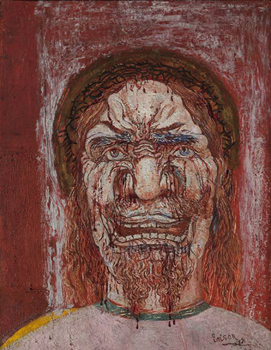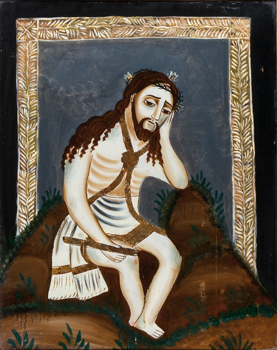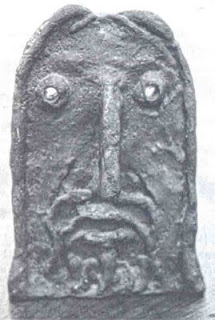From Our Archives
Two essays by Debie Thomas, Who Are We Looking For? (2021) and When I Am Lifted Up (2018).
For Sunday March 17, 2024
Fifth Sunday in Lent
Lectionary Readings (Revised Common Lectionary, Year B)
Jeremiah 31:31-34
Psalm 51:1-12 or Psalm 119:9-16
Hebrews 5:5-10
John 12:20-33
This Week's Essay
During the Jewish feast of Passover, some Gentile pilgrims approached Philip with a request that the disciples must have fielded many times during Jesus's ministry. Had they traveled all the way to Jerusalem just to ask their question?
"Sir, we would like to see Jesus."
Philip relayed their request to Andrew, and together they told Jesus. But their query fell on deaf ears and fizzles out. The story in John 12 then takes a new turn. We never learn if the Gentile pilgrims got an audience with the one about whom they had heard so many rumors. Jesus ignored them. He had darker things on his mind than the curiosity of the crowds.
I wonder—did Jesus rebuff an honest inquiry? Maybe. That sounds like the sort of strange thing he might do. Or, maybe these pilgrims were more like gawkers than genuine seekers? What did they hope to see or want to hear from Jesus? We just don't know.
 |
|
Man of Sorrows by James Ensor, 1891.
|
They never saw Jesus, but their question hangs in the air. I've asked their question for fifty years, in my own ways, and with my own motives. It sounds so simple. A straightforward request. But is it, really? Ever? Maybe it's one of those questions that asks more than you could ever realize. Perhaps it's an example of "be careful what you wish for."
Do I really want the real Jesus? Which Jesus? And why?
The miracle worker who turned water to wine and raised Lazarus from the dead? The story teller whose parables simultaneously revealed and obscured? The political provocateur who debated Roman taxes but welcomed Roman tax collectors, who blessed the peace makers and also welcomed a Roman soldier? The renegade rabbi who violated purity laws, broke the sabbath, embraced the sexually suspicious, ate with ethnic outsiders, and who profaned Israel's most sacred space, the temple?
The Jesus of John 12 is a deeply disturbed man. "Now my soul is troubled," he says. But he never asks God to save him from his suffering. He says that his troubles are the very reason he came.
"The hour has come for the Son of Man to be glorified. I tell you the truth, unless a kernel of wheat falls into the ground and dies, it remains only a single seed. But if it dies, it produces many seeds. The person who loves his life will lose it, while the one who hates his life in this world will keep it for eternal life. Whoever serves me must follow me; and where I am my servant will also be. My Father will honor the one who serves me."
This saying of Jesus takes us to the heart of Lent and the deepest meaning of the gospel. It was so central to his mission and message that all four gospels include it (and twice in Luke).
 |
|
Man of Sorrows, anonymous, 19th century Spain.
|
The epistle this week paints a similar picture of Jesus. Hebrews describes him as a person who was "subject to weakness." He was "tempted in every way, just as we are." He prayed his prayers to God "with loud cries and tears." This Jesus was despised and rejected, a man of sorrows who knew from experience the meaning of grief.
And likewise the penitential psalmist who laments his broken bones, broken spirit, and broken heart (51:8, 17).
This notion of a deeply disturbed Jesus who was tempted and tried like I am bothered some early Christians. Upon hearing words like these, Peter was shocked: "Lord, this shall never happen to you."
The second-century gnostics and docetics (from the Greek dokeo, "to seem or appear") argued that Jesus only "seemed" human. Surely he wasn't polluted by the trials and tribulations of our material existence! One Sunday in church I joked to a friend who's a historian that the baby Jesus never would have cried in the temple like the kid near us was wailing, to which she responded, "So, you're a docetist!"
Similarly, Jesus's baptism in the Jordan river made some Christians nervous. In the non-canonical Gospel of the Hebrews (c. 80–150 AD), Jesus seems to get baptized to please his mother, not to repent for his sins like everyone else.
This impulse to airbrush the humanity of Jesus remains with us today. The 1988 movie The Last Temptation of Christ portrays a deeply troubled Jesus. He confesses his sins, he fears insanity, he wonders if he's merely a man, and he anguishes over the people he didn't heal. In the "last" temptation of his execution, Jesus battles a hallucination sent by satan. He wonders what his life might have been like if he had chosen the path of an ordinary person. He fantasizes about marrying Mary Magdalene, growing old, and having kids.
 |
|
The Sorrow of Christ, scuplture
by K.C.S. Paniker (1911–1977). |
Many Christians were outraged by the movie. Blockbuster Video (remember them?!) even refused to carry it. What bothered people was the suggestion that Jesus was fully and truly human, that he was a person who experienced trials and temptations like I do—torment, doubt, loneliness, confusion, despair, erotic dreams, and, in his final hours, feeling abandoned by God.
But in trying to protect a perfect Jesus from a genuine humanity, we do the opposite of what he himself says and does. Instead of insulating himself from us, he fully participates with us. Hebrews insists that Jesus was "tempted in every way, just as we are—yet was without sin."
Consequently, since Jesus was subject to all our own weaknesses, "he is able to deal gently with those who are ignorant and are going astray."
The troubled Jesus shows me the human face of a compassionate God. Instead of fearing a far off deity, says Hebrews, "let us then approach the throne of grace with confidence, so that we may receive mercy and find grace to help in our time of need.”
Lent is a time to offer God our own "loud cries and tears." Our broken hearts and spirits. Our own troubled souls. And most certainly all the pain and violence in our world, like 30,000 people killed in Gaza. We're like grains of wheat falling into the earth to die.
"Sir, we would like to see Jesus." Well, that would be the Jesus of Hebrews 5:7 who prays just like we do, "with loud cries and tears."
If I can't see Jesus the miracle worker—and I still pray for that, I take solace in the deeply disturbed Jesus. And in the reminder of the psalmist this week that "the sacrifices of God are a broken spirit; / a broken and contrite heart, / O God, you will not despise."
Weekly Prayer
John Donne (1572–1631)
Death Be Not Proud (Holy Sonnet X)
Death, be not proud, though some have called thee
Mighty and dreadful, for thou are not so;
For those whom thou think'st thou dost overthrow
Die not, poor Death, nor yet canst thou kill me.
From rest and sleep, which but thy pictures be,
Much pleasure; then from thee much more must flow,
And soonest our best men with thee do go,
Rest of their bones, and soul's delivery.
Thou'art slave to fate, chance, kings, and desperate men,
And dost with poison, war, and sickness dwell,
And poppy'or charms can make us sleep as well
And better than thy stroke; why swell'st thou then?
One short sleep past, we wake eternally,
And death shall be no more; Death, thou shalt die.
Dan Clendenin: dan@journeywithjesus.net
Image credits: (1) Koninklijk Museum voor Shonen Kunsten Antwerpen; (2) Wikipedia.org; and (3) Wandering4LoveofGod.





